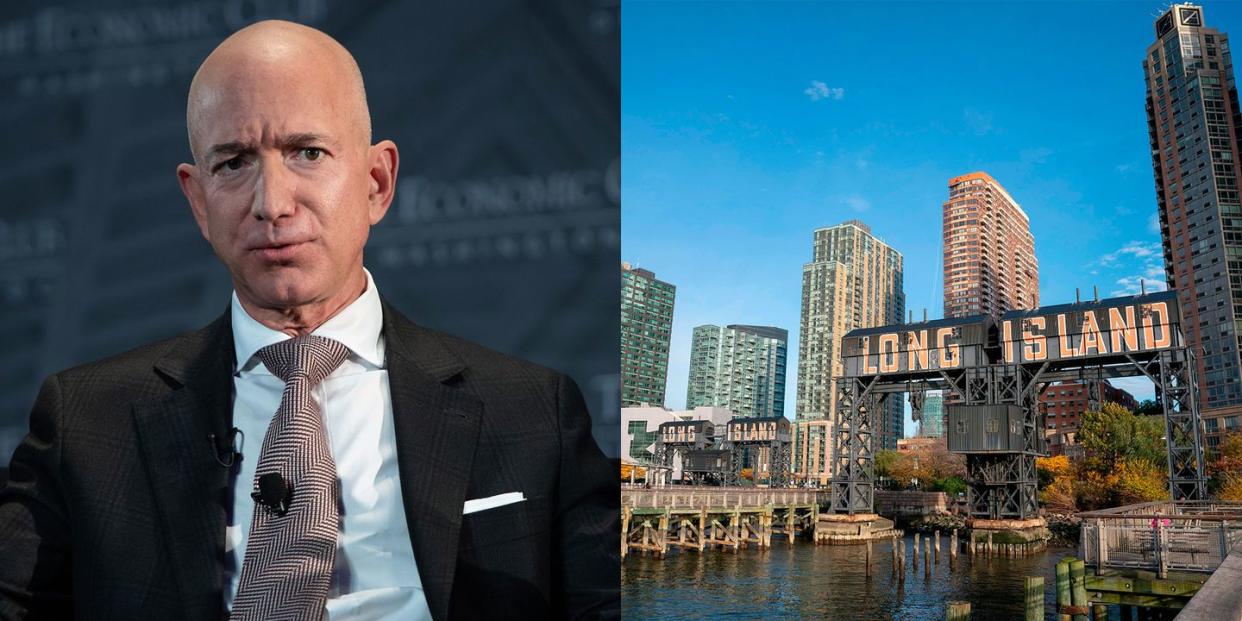A Timeline of Amazon's "HQ2," From the First Announcement to a Failed Campus in New York City

This morning, Amazon announced that it was scrapping plans for a new campus in New York City. The opportunity to host an Amazon headquarters-nicknamed "HQ2"-was something that cities across the country fought to secure. And yet, it was people from New York that prevented Amazon from moving in. Here's how we got here.
In 2017, Amazon said that it was looking to build a second headquarters, and began seeking applications from interested cities.
Amazon released a memo detailing exactly what it was looking for in its second home; in its words, the company was "soliciting specific information that will allow Amazon to determine the ideal location for our project."
The memo lists certain practical specifications, like square foot requirements, proximity to mass transit, and more. It also contains information about Amazon's "decision drivers," which ranged from "a stable and business-friendly environment and tax structure" to "incentives," including myriad tax exemptions, grants-the list goes on.
Amazon also stipulated what it would offer in return: $5 billion in capital investments and 50,000 jobs.

In October 2017, Amazon announced that it had received 238 bids.
Cities big and small alike submitted their proposals. Many of these came with substantial deal-sweeteners for Amazon; Stonecrest, Georgia famously even offered to rename its city "Amazon" if it were chosen.
Among them were the eventual winners: a Virginia suburb outside of Washington, D.C., and New York's Long Island City. New York Governor Andrew Cuomo was extremely interested in the opportunity, saying he'd "change his name to Amazon Cuomo if that’s what it takes."

In November 2018, Amazon announced the location of its coveted new headquarters. Rather than choose to grow the economy of a smaller municipality, the company decided to split its "HQ2" between New York City and Washington, D.C.
The decision was met with widespread criticism. Many accused Amazon of using the spectacle of a contest to secure better terms with the two cities it had wanted all along. In New York City's case, the terms included up to $3 billion in incentives.
New York citizens were also concern about how Amazon's arrival would inflate housing costs, which had already been rising rapidly in Long Island City.
In a joint statement, New York state senator Michael Gianaris and city council member Jimmy Van Bramer condemned the deal. "We are witness to a cynical game in which Amazon duped New York into offering unprecedented amounts of tax dollars to one of the wealthiest companies on Earth for a promise of jobs that would represent less than 3 percent of the jobs typically created in our city over a 10 year period," they said.
For her part, newly elected Congresswoman Alexandria Ocasio-Cortez took to Twitter to express her opposition to the agreement, and to channel Queens residents' "outrage." "Amazon is a billion-dollar company," she wrote. "The idea that it will receive hundreds of millions of dollars in tax breaks at a time when our subway is crumbling and our communities need MORE investment, not less, is extremely concerning to residents here."
Amazon is a billion-dollar company. The idea that it will receive hundreds of millions of dollars in tax breaks at a time when our subway is crumbling and our communities need MORE investment, not less, is extremely concerning to residents here.
- Alexandria Ocasio-Cortez (@AOC) November 13, 2018
Lawmakers and citizens began to organize to block Amazon's move to Long Island City.
Union leaders, community organizers, and some lawmakers formed an effective opposition. Protesters filled City Council hearings, and rallied outside of public housing developments neighboring Amazon's proposed site.

On February 14, 2019, Amazon announced that it was cancelling its plans for the Long Island City corporate campus.
Earlier this week, Governer Cuomo and New York City Mayor Bill de Blasio met in Albany to discuss how to save the deal, per the New York Times. Their respected offices continued to assure Amazon that the agreement would go through despite opposition, but "the company appeared upset at even a moderate level of resistance," the New York Times's source said.
Amazon's leadership agreed to pull out on the 13th, informing de Blasio and Cuomo not long before issuing a public statement. "A number of state and local politicians have made it clear that they oppose our presence and will not work with us to build the type of relationships that are required to go forward," the statement read.
('You Might Also Like',)

